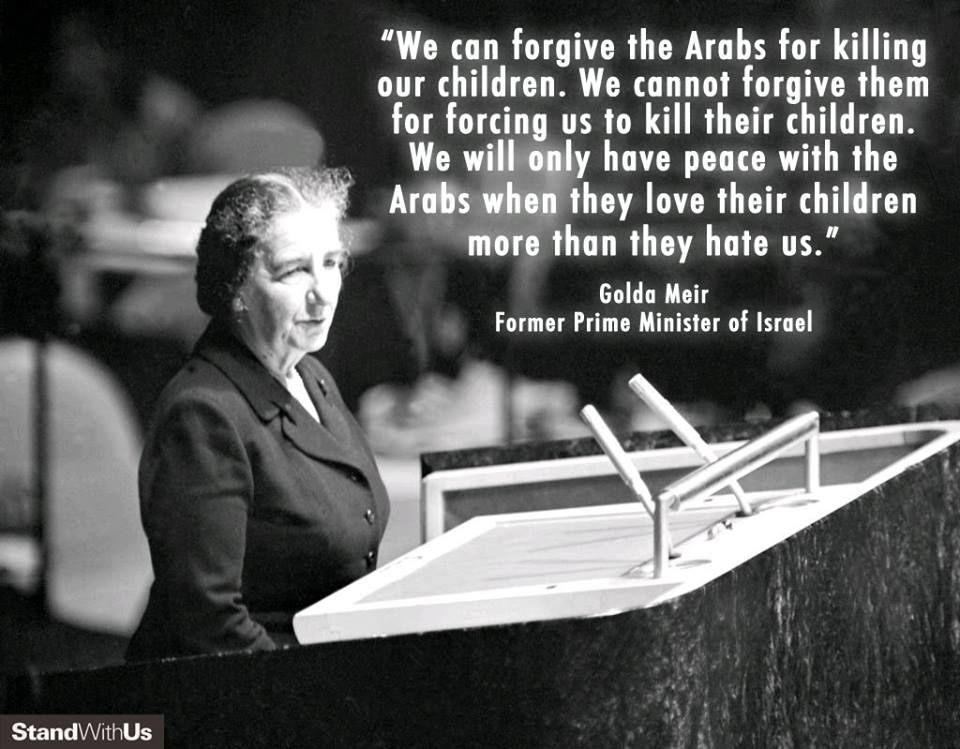CAN ANYONE CHECK IF THESE QUOTES WERE CORRECTLY ATTRIBUTED TO GOLDA MEIR?


| This thread has been locked, it will not receive new replies. |
| Locked on 06/16/2021 9:54:42 AM PDT by Admin Moderator, reason: |
Posted on 06/16/2021 8:12:41 AM PDT by Conservat1
To be misquoted is an occupational hazard of political leadership; for this reason I should like to clarify my position in regard to the Palestinian issue. I have been charged with being rigidly insensitive to the question of the Palestinian Arabs. In evidence of this I am supposed to have said, “There are no Palestinians.” My actual words were: “There is no Palestinian people. There are Palestinian refugees.”
The distinction is not semantic. My statement was based on a lifetime of debates with Arab nationalists who vehemently excluded a separatist Palestinian Arab nationalism from their formulations. When in 1921 I came to Palestine – until the end of World War I a barren, sparsely inhabited Turkish province – we, the Jewish pioneers, were the avowed Palestinians. So we were named in the world. Arab nationalists, on the other hand, stridently rejected the designation. Arab spokesmen continued to insist that the land we had cherished for centuries was, like Lebanon, merely a fragment of Syria. On the grounds that it dismembered an ideal unitary Arab state, they fought before the Anglo-American Committee of Inquiry and at the United Nations. When the Arab historian Philip K. Hitti informed the Anglo-American Committee of Inquiry that “there is no such thing as Palestine in history,” it was left to David Ben-Gurion to stress the central role of Palestine in Jewish, if not Arab, history.
As late as May 1956, Ahmed Shukairy, subsequently head of the Palestine Liberation Organization, declared to the United Nations Security Council, “It is common knowledge that Palestine is nothing but southern Syria.” In view of this, I believe I may be forgiven if I took Arab spokesmen at their word.
(Excerpt) Read more at static01.nyt.com ...


Thanks. True then true today.
And yet now FReepers are falsely claiming the Isreali government has been “taken over” by “leftists and socialists”. News flash: Golda Meir was MUCH much further left than the new Israeli PM.
She was a leftist labor union official who joined Mapai (the left-wing Israeli Workers Party), worked on strenghtening relationships with the Soviets, and was later the leader of the Labor Party when she was PM.
Bennett, an Orthodox Jew (the first time an Orthodox Jew has been PM) is the leader of Yamina (in partnership with the New Right party), a hardcore conservative organization that has long staked out positions to the RIGHT of Netanyahu.
Let us hope the Arab Mansour Abass and the few leftists won’t force his hands. In any case, The Guardian of Israel [Psalms 121:4] will keep watch..
In answer to your question see as early as 1970. I would tryst the Haaretz only in earlier years on accuracy... not yiday when they don’t meet Nachum Barnea’s lynch test...
____
New Outlook. (1970). Israel: Hashkafah Hadashah., p.56
... recently , necessary but focussing our hopes Prime Minister Mrs. Golda Meir said : on peace, on the day we pray will “ We can forgive the Arabs for killing come...
https://books.google.com/books?id=8aFtAAAAMAAJ&q=%22we+can+forgive%22
Marlow, J. (1981). The Great Women. United States: Galahad Books., p.308
In December, 1969, the 70-year-old grandmother became the fourth prime minister of Israel, inheriting from her predecessor a constituency demoralized by constant war and economic hardship. Throughout the early seventies, Golda attempted to achieve an end to hostilities in the Mideast through diplomatic negotiations. She met with Rumanian Premier Nicolai Ceausescu, American President Richard Nixon, and Pope Paul VI, and in 1973 welcomed West German Chancellor Willy Brandt to Israel. Meanwhile, she mediated between "hawks" and "doves" within the Israeli cabinet, and served as a rallying point for moderates who were firmly committed to the state of Israel but sought a reconciliation with their Arab neighbors.
She was not, however, to live to see Israel officially at peace with its Arab neighbors.
The Yom Kippur attack by Egypt on October 6, 1973, left this brave warrior utterly disconsolate. On April 10, 1974, she resigned as prime minister.
At the age of 75, Golda Meir had served her country for nearly half a century, and was ready to make way for younger patriots to assume the reins of power.
A highlight of the historic occasion of Egyptian President Anwar Sadat's landing in Israel was the embrace between these two formidable old enemies. After a 12-year bout with leukemia, Golda, the beloved Jewish grandmother, died on December 8, 1978.
Golda Meir was a nonpareil among women rulers , for she rose to power not through hereditary privilege , nor powerful male connections , nor exploitation of sexual charms.
Almost 50 years of devoted service to the state of Israel had demonstrated her political acumen and diplomatic facility under extreme adversity.
As a wartime leader, she showed military determination, but also compassion for her adversaries.
Among her many memorable utterances was: "Someday, when peace comes, we may forgive the Arabs for having killed our sons, but it will be harder for us to forgive them for having forced us to kill their sons."
Read later.
Disclaimer: Opinions posted on Free Republic are those of the individual posters and do not necessarily represent the opinion of Free Republic or its management. All materials posted herein are protected by copyright law and the exemption for fair use of copyrighted works.